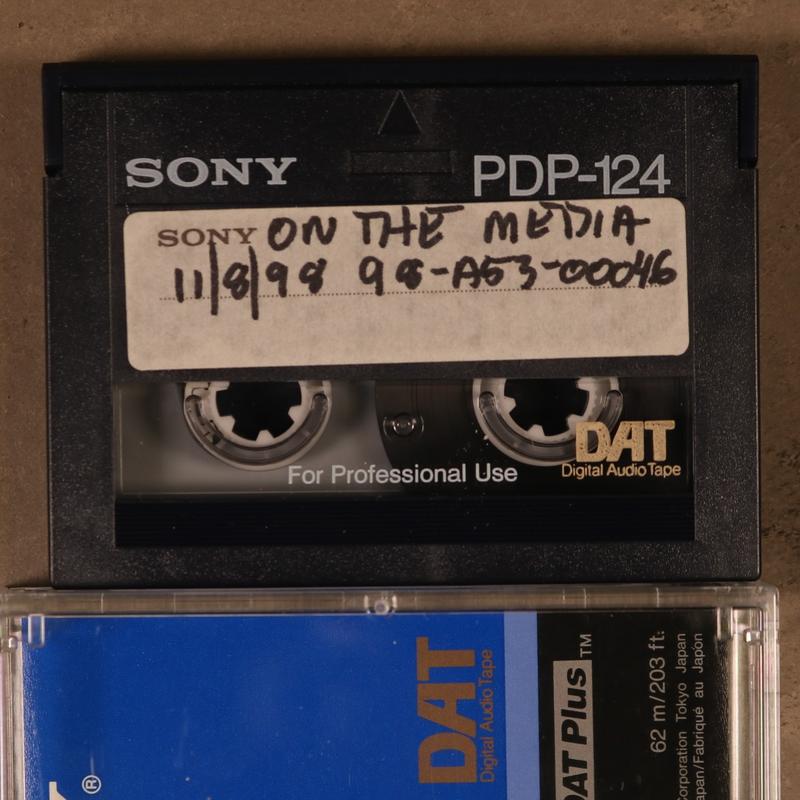 The NYPR Archive Collections
The NYPR Archive Collections
Gingrich GONE; TV Sweeps; Happiness and TV; Dewey Defeats Truman; Holocaust in New Media

Sunday, November 8, 1998
The campaigns are over and the TV ads are off the tube. But what do the ads -- and the coverage of the campaigns -- tell us about the issues and the candidates? Find out this week on NPR's On the Media. Also: are people who watch soap operas happier? Plus a look at how TV sweeps work. And: real journalists: are they a thing of the past? That's this week on NPR's On the Media.
Election coverage: A Reassessment
Much of the campaign coverage leading up to elections was all about ads: which ones are negative, which are successful, how much the candidates are spending. After the votes are tallied, though, the coverage switches to the candidate and issues. On the Media this week looks at what it all means. With guests David Brooks of The Daily Standard and Mark Hertsgaard of Johns Hopkins University and author of On Bended Knee: The Press and the Reagan Presidency joining guest host Brooke Gladstone.
TV Sweeps: Commentary
Blockbusters are set against blockbusters as networks scramble for numbers to set their ad rates. But commentator Marvin Kitman of Newsday says the numbers are artificial, so why the charade?
Soaps Make People Happy or: You Are What You Watch
A recent study shows that people who watch TV soaps are happier than those who don't, but that people who watch a LOT of TV are not happy. Our intrepid reporter Marianne McCune looks into a number of correlations between people's TV habits and how they feel. You ARE what you watch!
The Boyz and Girlz Channels: Commentary
Rupert Murdoch's Fox TV is planning two new television channels: one for boys and one for girls. Susan Douglas, author, "Where the Girls Are: Growing Up Female with the Mass Media"; Professor of Communication Studies, University of Michigan
Are Real Journalists Out of Date?
Are we entering an era of "ATM journalism"? Journalists once were said to "apply judgement to information." But, says author and journalist Richard Reeves, "Perhaps journalism is just another endangered job description." Or -- are we just changing the ways we gather and disseminate news?
Guests are Richard Reeves, is a syndicated columnist, former senior political correspondent for the New York Times, professor of journalism at USC, and the author of "What the People Know: Freedom and the Press" and William Powers of National Journal.
Press and the People Disconnect
In 1948, a news headline declared Thomas Dewey the winner over President Harry S. Truman. He wasn't. How could the press have gotten it so wrong? Why the disconnect between the way the press and the people view politics? Brooke Gladstone reports that tomorrow's headlines may not tell people what they really want to know. Commentaries by James Baughman, author of Republic of Mass Culture and historian Franklin Dean Mitchell.
Documenting the Holocaust
How best to remember and portray the Holocaust is a difficult question to ask, let alone answer. In Germany, battles over a Holocaust memorial in Berlin have raged for years, with one plan after another rejected. But the newest proposal is to create a multi-media memorial. It would make use of the interviews collected by Steven Spielberg's Survivors of the Shoah Visual History Foundation which has collected tens of thousands of interviews with Holocaust survivors. Interviews with four of these survivors have been assembled on CD-ROM. Dr. Michael Berenbaum, President of the Survivors of the Shoah Visual History Foundation, is today's guest.
WNYC archives id: 53407